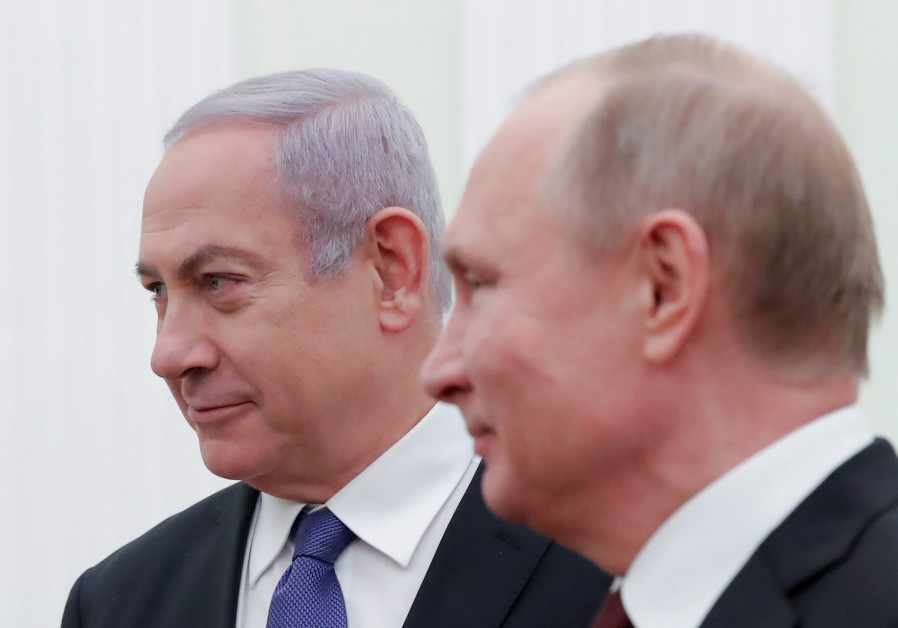Russia’s embassy in Israel puts out a weekly newsletter that is particularly interesting revealing Moscow’s views of the region.
Seth J. Frantzman

Russia has been wrestling with its Middle East policy amid the US-Iran tensions, hoping to make Moscow appear as the stable and mature force as others squabble. Moscow routinely portrays its policy as consistent, while asserting that the US and its support for various policies have plunged places like Libya into anarchy and chaos. In addition, Russia attempts to argue that its role is in line with international law while others may be disrespecting the “sovereignty” of states or violating various norms.
Russia’s embassy in Israel puts out a weekly newsletter that is particularly interesting, revealing Moscow’s views of the region and Israel-Russia relations. This is important, because Moscow hints at some of its long-term policies in Syria and how it views the US-Iran tensions.
In the recent newsletter covering the period June 21-27, it mentioned that Russian President Vladimir Putin would be in Osaka for the G20 and that he would have bilateral meetings with counterparts from Turkey, Egypt, Saudi Arabia and the US. “Moscow has watched with concern as the US has ratcheted up tensions around Iran for over a year,” the statement says. The US has leveled “baseless charges” at the Iran deal and taken actions that are “intended to provoke Iran.” Russia says that the US is trying to dictate policies to others, but that Moscow “stands in full solidarity with the friendly people of Iran and its government.” The US takes “reckless” action that could destabilize the Middle East, the Russians say.
However, Moscow sent Secretary of the Security Council of Russia Nikolay Patrushev to Israel to meet with National Security Adviser Meir Ben-Shabbat and US National Security Advisor John Bolton on June 24. They discussed the region, and Russia said it was committed to the sovereignty of Syria. Moscow believes the Syrian conflict has “no military solution” and they want to reduce tensions in “Israeli-Iranian relations” through reciprocal steps. Syria must not become a place of geopolitical confrontation.
Russia rejected rhetoric by the US that blames Iran for terrorism and said Tehran is an “ally and partner” of Russia. Russian Foreign Minister Sergey Lavrov said the US was focusing on Iran and that this obsession could harm the larger region. Russia, in contrast, was supposedly working for dialogue between Arab countries and Iran, and argued that Syria should be reinstated into the Arab League. Lavrov also said that Russia was opposed to “any attempts to move the entire Syrian discussion onto an anti-Iran track.”
A SECOND STATEMENT on June 18 made in the city of Ufa by Sergey Naryshkin, director of Russia’s Foreign Intelligence Service, during a meeting of national security officials from around the world also included comments on Russia’s regional view. He asserted that conflicts today were “hybrid” in nature, meaning they constituted “social, economic and spiritual spheres as well.” Today, with increased globalization and new technologies, this is important to understand even more. “Naturally, under these conditions, the role of non-military tools in interstate relations is growing – which, however, does not deny the importance of possessing powerful armed forces.
“It’s an open secret that over the past several years, [sanctions] became a favorite method of US policy…. The most recent dramatic example is the inclusion into the American terrorist lists of the Iranian Revolutionary Guards Corps [IRGC] – the very organization that has made a great contribution to the fight against the Islamic State on the territory of Syria and Iraq,” Naryshkin said. The US, he said, was being “extremely destructive” in these policies, and was aggressive and unpredictable. He hinted that sanctions were forcing countries to “rearrange their economic activity and incur extra costs. Global chains of production and delivery of raw materials, goods and services break down, affecting negatively the whole of the world economy.”
This has ramifications. “The use of the American currency is now associated with such serious risks that an increasing number of states justifiably think of looking for alternative tools for foreign trade operations and step-by-step move away from using the dollar in international payments.”
He slammed the West for downgrading recognition of Russia’s role in the defeat of the Nazis and also the Western support for drug use. “Various programs promoting the rights of LGBT community and spreading the ideas of radical feminism are implemented in order to accelerate the process of diluting the notion of sex identity, the values of family and marriage.”
Although these comments were not directly related to Russia’s role in the Middle East, they show that Russia sees itself as a different civilizational model than the West, connected more closely to more conservative countries.
Content retrieved from: https://www.jpost.com/Middle-East/Russia-and-Syria-How-Moscow-views-the-Middle-East-today-594172?fbclid=IwAR0rPg7quzv1I_DBT7cLaXuhf-NP8qUACUgTFxDH7oss8WpHM-KlAIl5iJw.